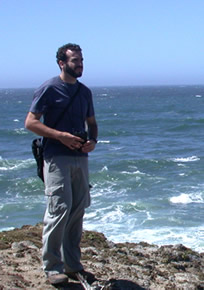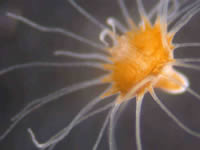|
 I am intrigued by the evolution of mutualistic systems that we commonly observe in nature, but can hardly explain. The evolution of cooperation is paradoxical, since we generally understand natural selection to work in a selfish manner. Thus, cooperation (specifically between non-relatives) requires that individuals personally gain from their cooperative acts. My interest is to understand how cooperative individuals gain from their benevolent acts, and how “cheaters” or “free-loaders” are curtailed in mutualistic systems. There is a surprisingly diverse set of mutualisms in nature for which we have no firm understanding of how cooperation originated or is maintained, and why these systems aren’t destabilized by cheaters (individuals that gain the benefits from a partner, yet contribute nothing in return, as a parasite). I am intrigued by the evolution of mutualistic systems that we commonly observe in nature, but can hardly explain. The evolution of cooperation is paradoxical, since we generally understand natural selection to work in a selfish manner. Thus, cooperation (specifically between non-relatives) requires that individuals personally gain from their cooperative acts. My interest is to understand how cooperative individuals gain from their benevolent acts, and how “cheaters” or “free-loaders” are curtailed in mutualistic systems. There is a surprisingly diverse set of mutualisms in nature for which we have no firm understanding of how cooperation originated or is maintained, and why these systems aren’t destabilized by cheaters (individuals that gain the benefits from a partner, yet contribute nothing in return, as a parasite).
I am particularly fascinated by endo-symbioses, or intimate interactions between species with one partner often living inside of the other. In the most general sense, symbionts may be parasites, such as bacteria that can kill hosts and cause epidemics in humans and crops. Symbionts may also be mutualists, typified by mutually beneficial interactions such as the nitrogen-fixing bacteria in bean plants, photosynthetic algae harbored in coral reefs, and the beneficial bacteria in the guts of mammals, including humans. Symbiont effects on hosts thus range a wide continuum from benevolent to parasitic.
My recent work has ranged from experimental evolution of cooperation and conflict in algal symbionts of jellyfish as well as bacteriophage. Current work is on the legume-rhizobium symbiosis. I have a central interest in the general theory of cooperation, and this guides my experimental work.
[ Curriculum Vitae ]
 Publications: Publications:
- Sachs, J.L. 2004. The evolution of cooperation and conflict, experimental model systems and theory. Ph.d Dissertation. University of Texas – Austin.
- Sachs, J. L., Mueller, U. G., Wilcox, T. P., and Bull, J. J. 2004. The Evolution of Cooperation, Quarterly Review of Biology 79:135-160. [PDF]
- Nuechterlein, G.L., Buitron, D., Sachs, J.L. and Hughes, C.R. 2003. Red-necked Grebes become semi-colonial when prime nesting habitat is available, Condor. 105(1). [PDF]
- Sachs, J.L., Hughes, C.R. 1999. Characterization of microsatellite loci for red-necked grebes Podiceps grisegena. Molecular Ecology. 8, 687-688. [PDF]
- Sachs, J.L. 1998. The Evolutionary Origin of Coloniality: A Test of Hypotheses with the Red-necked Grebe. Masters Thesis. University of North Dakota.
 Submitted Publications: Submitted Publications:
- Sachs, J.L. and Wilcox, T.P. Cheating in the Cnidarian symbiont Symbiodinium microadriaticum
- Sachs, J.L. and Bull, J.J. Evolution of conflict mediation between genomes
- Sachs, J.L., Hughes, C.R., Nuechterlein, G.L., and Buitron, D. The evolution of colonial breeding in birds: A test of hypotheses with the red-necked grebe.
 Book Review: Book Review:
- Sachs, J.L. The evolving field of cooperation. Review of Genetic and Cultural Evolution of Cooperation. 2003. Dahlem workshop report. Peter Hammerstein, Ed. Dahlem University Press, Cambridge. In Quarterly Review of Biology In press. [PDF]
 Press Coverage Press Coverage
- Fast friends, sworn enemies. Liz Pennisi 2003. Science 302:774-775. [PDF]
|











